CNC Machining PEEK Plastic
PEEK stands for Polyether Ether Ketone, a high-performance engineering thermoplastic material known for its excellent mechanical, chemical, and thermal properties.
CNC machining can be used to process PEEK, enabling the production of PEEK parts with precise tolerances and intricate geometries.
- Certified Materials
- Factory Price
- No Minimum Order
- Fast Turnaround
Save 30% cost on average!

CNC Machining Service for Custom PEEK Parts
With twenty years of machining, we have gained a good deal of experience in the processing of PEEK materials no matter what kind of brand you are, whether auto, marine use, industrial, or new energy we can meet your expectations of delivering parts.
Request a quote now for the best peek CNC machining solutions available!
Get precise and versatile machining of PEEK parts with our optimized 3, 4, and 5-axis CNC milling service.

Combine lathe and milling capabilities for efficient CNC turning with live tooling, ideal for machining PEEK parts with cylindrical features
Enhance the surface finish of CNC machined PEEK parts through additional finishing techniques like polishing or sandblasting
What is PEEK
PEEK is a high-performing thermoplastic with excellent mechanical, chemical, and thermal properties, well-suited for demanding applications and extreme environments. It’s biocompatible, and parts can be produced with tight tolerances and complex geometries using techniques like injection molding, extrusion, and CNC machining, perfect for high-precision industries
Some of the key properties of PEEK include:

- High Temperature Resistance
- Chemical Resistance
- High Strength and Stiffness
- Low Friction
- Lightweight
PEEK-1000 is manufactured from pure polyether ether ketone resin and has the best toughness and impact resistance of all PEEK grades. It can be sterilized using the most convenient ways including steam, dry heat, ethanol, and y-rays; the material that is used to manufacture PEEK that is raw material components meet EU and FDA requirements for food hardness hence making them fit perfectly for very frequent application in medical, pharmaceutical and food processing industries.
PEEK-HPV is PEEK plus PTFE, graphite and carbon fiber giving it a bearing grade plastic overall. It has better friction character than the standard PEEK-1000 (CoF, wear resistance, peak pressure) make this grade particularly suitable for friction purposes.
PEEK-GF30 is a reinforced grade plastic filled with 30% glass fibers. It has better rigidity and creep resistance than PEEK-1000, as well as better dimensional stability, making it ideal for structural parts. It is ideal for structural parts because it can withstand fixed loads at high temperatures for extended periods of time. If PEEK-GF30 is used as a sliding part, its suitability should be carefully tested.
Higher than that of the glass fiber reinforced PEEK material, but PEEK-CA30 material filled with 30% carbon fiber reinforcement has higher modulus of elasticity, mechanical strength and creep resisting ability, and wear resistance compared with PEEK-GF30, and the result of the test of the carbon fiber reinforced plastic is 3. Conductive and rigid five times beyond unreinforced PEEK and helped eject the heat from bearing surfaces.
PEEK Mechanical Properties Chart
To improve the mechanics and mechanical properties of PEEK materials, one can select from various PEEK grades, gain a better understanding of these materials, and choose the one that best fits the project requirements.
| Property | PEEK-1000 | PEEK-HPV | PEEK-GF30 | PEEK-CA30 |
|---|---|---|---|---|
| Tensile Strength (MPa) | 115 | 78 | 80 | 135 |
| Flexural Strength (MPa) | 170 | 125 | 155 | 220 |
| Elastic Modulus (GPa) | 4.3 | 5.9 | 7 | 11 |
| Charpy Impact Strength - Notched (kJ/m²) | 3.5 | 3 | 3 | 4 |
| Compressive Stress at 1 / 2 / 5 % Nominal Strain (MPa) | 38 / 75 / 140 | 46 / 80 / 120 | 54 / 103 / 155 | 80 / 150 / 200 |
| Rockwell M Hardness (14) | 105 | 85 | 100 | 102 |
| Heat Deflection Temperature: Method A: 1.8 MPa (264 PSI) (°C) | 160 | 195 | 230 | 160 |
| Continuous Allowable Service Temperature in Air (20,000 hrs) (°C) | 250 | 250 | 250 | 250 |
| Wear Rate (µm/km) | 28 | 2 | 7 | - |
| Dynamic Coefficient of Friction (-) | 0.3-0.5 | 0.15-0.25 | 0.3-0.45 | - |
- AT team uses Mitsubishi Chemical Group PEEK materials to ensure that the performance of these materials is fully compliant.
PEEK CNC machining refers to the process of using computer numerical control (CNC) machines to shape, cut, or drill PEEK material into a desired shape or form.
To ensure optimal CNC machining of PEEK materials, it’s essential to address the issue of chips sticking to the tool during the process. Sticking chips can cause tool wear and a reduction in the quality of the machined surface. To mitigate these challenges, appropriate cutting tools, machining parameters, and cooling strategies are critical.
Contact AT-Machining for expert CNC machining of PEEK and other thermoplastics. Our skilled engineers and machinists will tailor high-quality components to your specifications.

Benefit of PEEK CNC machining
There are several benefits to CNC machining polyether-ether-ketone (PEEK):
High Precision
CNC machining allows for high precision and accuracy in the production of PEEK parts, making it possible to create complex shapes and features with tight tolerances.
Consistency
CNC machines can produce a large volume of PEEK parts with consistent quality and dimensional accuracy, ensuring that each part meets the required specifications.
Faster Turnaround
CNC machining can produce parts quickly and efficiently, which can reduce the time and cost associated with traditional manufacturing methods
Flexibility
CNC machines can produce PEEK parts in a wide range of shapes and sizes, making it possible to create customized parts to meet specific design requirements.
Material Properties
PEEK's exceptional properties suit demanding applications and environments. CNC machining produces high-performance parts that leverage these strengths to meet specifications
Cost-Effective
CNC is an affordable method for low-volume production runs as it has low setup costs and can be automated, lessening the requirement for manual labor.

Optimize Design
Simplifying the design and reducing the complexity of the part can reduce machining time and waste material

Larger Batch Sizes
Ordering larger quantities of parts can often result in reduced cost per part due to economies of scale

Use Efficient Tool Paths
CNC machines can be programmed to use the most efficient tool paths to reduce machining time and tool wear

Supplier Selection
Selecting an experienced CNC machining company like AT-Machining can produce PEEK parts cost-effectively. A skilled supplier can provide expertise in material selection, part design, and machining optimization to reduce costs.
Gallery of CNC machined PEEK parts
Our manufacturing capabilities serve diverse industries, including medical, aerospace, and marine robotics. We take on projects of any size and offer exceptional service to all customers
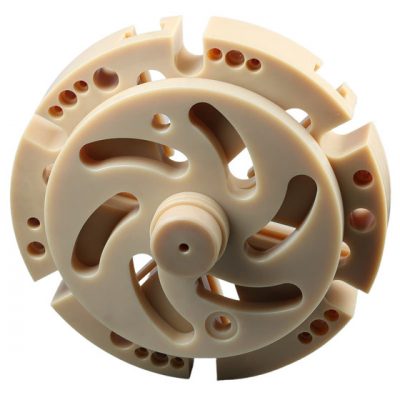
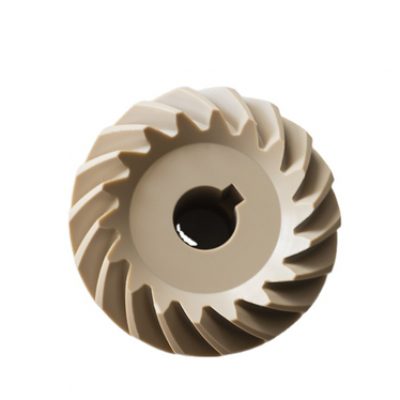
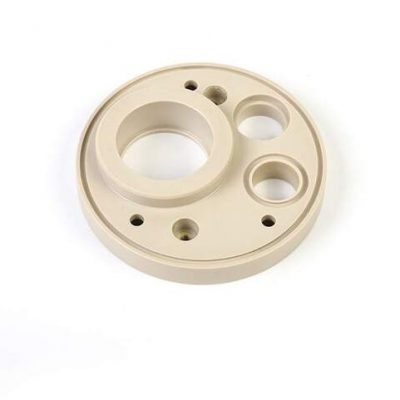
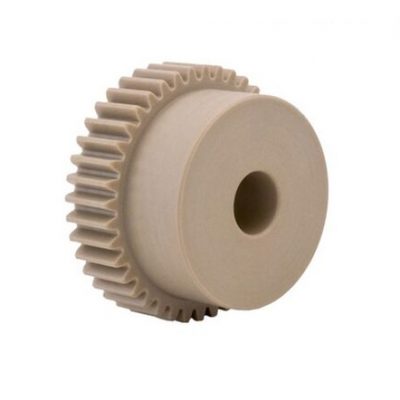
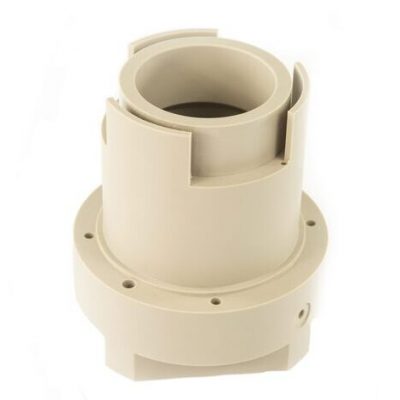
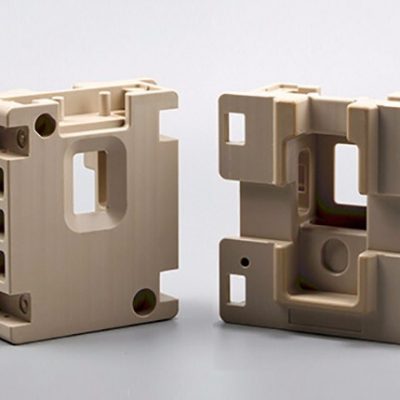
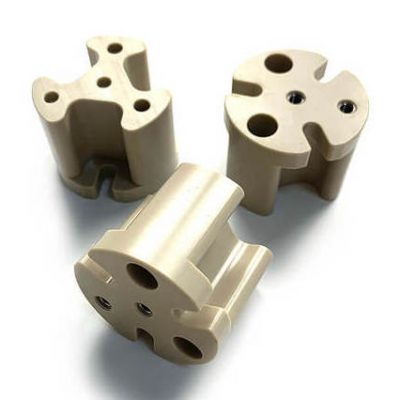
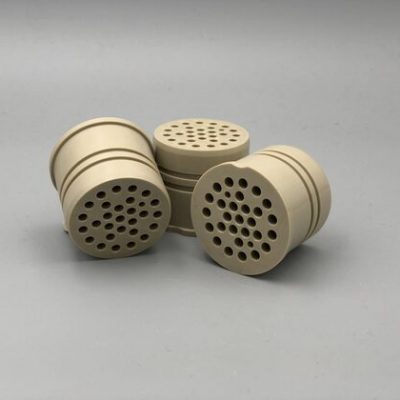
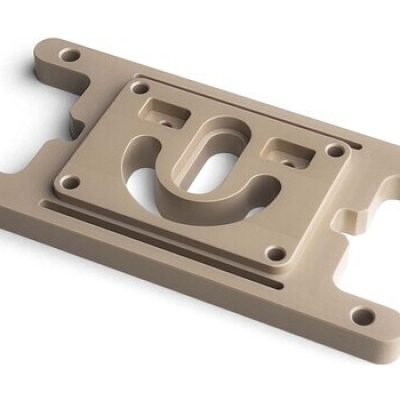
AT-Machining
Meeting Your Needs, Solving Your Problems!
Expert material knowledge for your ideal CNC parts!

CNC Machining PEEK FAQs
Yes,CNC machining is one of the most common methods used to machine PEEK. CNC machining involves using computer-controlled tools to cut and shape the PEEK material into the desired shape and size. The process can produce high-precision, high-quality parts with tight tolerances and complex geometries.
PEEK machining’s precise tolerances depend on factors such as part size, complexity, equipment, and method used. CNC machining is common and can achieve ±0.005 to ±0.010 inches (0.127 to 0.254 mm) tolerances, but experienced machinists may use specialized tooling to achieve tighter tolerances despite PEEK’s hardness and toughness
PEEK, along with high-performance engineering thermoplastics such as PEI, PPS, PAI, and PSU, offers high temperature and chemical resistance, as well as excellent mechanical and electrical properties. These materials find uses in high-strength applications in the aerospace, automotive, and electrical industries. Alternatives may be considered depending on the application due to their similar properties.
Acetal (POM), along with other plastics like acrylic (PMMA), polyethylene (PE), polypropylene (PP), and polycarbonate (PC), are relatively easy to machine due to their good machinability and dimensional stability. However, the ease of CNC cutting depends on the specific application requirements and the equipment and tools used.
PEEK parts produced by CNC machining are used in aerospace, defense, medical, automotive, and electrical industries. Its high strength, stiffness, and resistance to harsh environments make it suitable for demanding applications, including medical implants and prosthetics.
PEEK is a high-performance material with excellent strength and chemical resistance, while POM is a low-friction, wear-resistant material that is easy to machine and has good dimensional stability. The choice of material will depend on the specific requirements of the application


